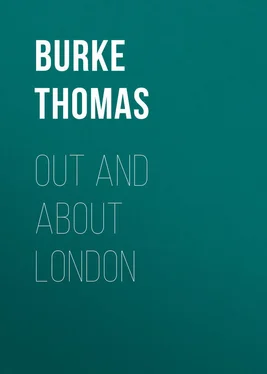Thomas Burke - Out and About London
Здесь есть возможность читать онлайн «Thomas Burke - Out and About London» — ознакомительный отрывок электронной книги совершенно бесплатно, а после прочтения отрывка купить полную версию. В некоторых случаях можно слушать аудио, скачать через торрент в формате fb2 и присутствует краткое содержание. Жанр: foreign_antique, foreign_prose, на английском языке. Описание произведения, (предисловие) а так же отзывы посетителей доступны на портале библиотеки ЛибКат.
- Название:Out and About London
- Автор:
- Жанр:
- Год:неизвестен
- ISBN:нет данных
- Рейтинг книги:5 / 5. Голосов: 1
-
Избранное:Добавить в избранное
- Отзывы:
-
Ваша оценка:
- 100
- 1
- 2
- 3
- 4
- 5
Out and About London: краткое содержание, описание и аннотация
Предлагаем к чтению аннотацию, описание, краткое содержание или предисловие (зависит от того, что написал сам автор книги «Out and About London»). Если вы не нашли необходимую информацию о книге — напишите в комментариях, мы постараемся отыскать её.
Out and About London — читать онлайн ознакомительный отрывок
Ниже представлен текст книги, разбитый по страницам. Система сохранения места последней прочитанной страницы, позволяет с удобством читать онлайн бесплатно книгу «Out and About London», без необходимости каждый раз заново искать на чём Вы остановились. Поставьте закладку, и сможете в любой момент перейти на страницу, на которой закончили чтение.
Интервал:
Закладка:
Thomas Burke
Out and About London
1916
Lady, the world is old, and we are young.
The world is old to-night and full of tears
And tumbled dreams, and all its songs are sung,
And echoes rise no more from the tombed years.
Lady, the world is old, but we are young.
Once only shines the mellow moon so fair;
One speck of Time is Love's Eternity.
Once only can the stars so light your hair,
And the night make your eyes my psaltery.
Lady, the world is old. Love still is young.
Let us take hand ere the swift moment end.
My heart is but a lamp to light your way.
My song your counsellor, my love your friend,
Your soul the shrine whereat I kneel and pray.
Lady, the world grows old. Let us be young.
ROUND THE TOWN, 1917
It was a lucid, rain-washed morning – one of those rare mornings when London seems to laugh before you, disclosing her random beauties. In every park the trees were hung with adolescent tresses, green and white and yellow, and the sky was busy with scudding clouds. Even the solemn bricks had caught something of the sudden colour of the day, and London seemed to toss in its long, winter sleep and to take the heavy breaths of the awakening sluggard.
I turned from my Fleet Street window to my desk, took my pen, found it in good working order, and put it down. I was hoping that it would be damaged, or that the ink had run out; I like to deceive myself with some excuse for not working. But on this occasion none presented itself save the call of the streets and the happy aspect of things, and I made these serve my purpose. With me it is always thus. Let there come the first sharp taste of Spring in the February air and I am demoralized. Away with labour. The sun is shining. The sky is bland. There are seven hundred square miles of London in which Adventure is shyly lurking for those who will seek her out. What about it? So I drew five pounds from the cash-box, stuffed it into my waistcoat-pocket, and let myself loose, feeling, as the phrase goes, that I didn't care if it snowed. And as I walked, there rose in my heart a silly song, with no words and no tune; or, if any words, something like – how does it go? —
Boys and girls, come out to play —
Hi-ti-hiddley-hi-ti-hay!
But the fool is bent upon a twig. I found the boys preoccupied and the girls unwearied in war-work. One good comrade of the highways and byways had married a wife; and therefore he could not come. Another had bought a yoke of oxen, and must needs go and prove them – as though they were a problem of Euclid. Luckily, I ran against Caradoc Evans, disguised in a false beard, in order to escape the fury of the London Welshmen, and looking like the advance agent of a hard winter. Seeing my silly, hark-halloa face, he inquired what was up. I explained that I was out for a day's amusement – the first chance I had had since 1914. Whereupon, he ran me into a little place round the corner, and bought me an illicit drink at an hour when the minatory finger of Lord d'Abernon was still wagging; and informed me with tears in the voice, and many a "boy bach," and "old bloke," and "indeed," that this was the Year of Grace 1917, and that London was not amusing.
It was not until the third drink that I discovered how right he was. As a born Cockney, living close to London every minute of my life, I had not noticed the slow change in the face and soul of London. I had long been superficially aware that something was gone from the streets and the skies, but the feeling was no more definite than that of the gourmet whose palate hints that the cook has left something – it cannot say what – out of the soup. It was left for the swift perception of the immigrant Welshman to apprise me fully of the truth. But once it was presented to me, I saw it too clearly. My search for amusement, I knew then, was at an end, and what had promised to be an empurpling of the town seemed like to degenerate into a spelling-bee. Of course, I might have gone back to my desk; but the Spring had worked too far into my system to allow even a moment's consideration of that alternative. There remained nothing to do but to wander, and to pray for a glimpse of that tempestuous petticoat of youth that deserted us in 1914. It was a forlorn pursuit: I knew I would never touch its hem.
I never did. I wandered all day with Caradoc bach, and we did this and we did that, while I strove to shake from my shoulders the bundle of dismay that seemed fastened there. The young men having gone to war, the streets were filled with middle-aged women of thirty, in short skirts, trying to attract the aged satyrs, the only men that remained, by pretending to be little girls. At mid-day, that hour when, throughout London, you may hear the symphony of swinging gates and creaking bolts, we paid hurried calls at the old haunts. They were either empty or filled with new faces. Rule's, in Maiden Lane, was deserted. The Bodega had been besieged by, and had capitulated to, the Colonial army. Mooney's had become the property of the London Irish. The vociferous rehearsal crowds had decamped from the Bedford Head, and left it to strayed and gloomy Service men, who cared nothing for its traditions; and Yates's Wine Lodge, the home of the blue-chinned laddies looking for a shop, was filled with women war-workers.
Truly, London was no more herself. The word carried no more the magical quality with which of old time it was endued. She was no more the intellectual centre, or the political centre, or the social centre of the world. She was not even an English city, like Leeds or Sheffield or Birmingham. She was a large city with a population of nondescript millions.
This I realized more clearly when, a week or so after our tour, an American, whom I was conducting round London, asked me to show him something typically English. I couldn't. I tried to take him to an English restaurant. There was none. Even the old chop-houses, under prevailing restrictions, were offering manufactured food like spaghetti and disguised offal. I turned to the programmes of the music-halls. Here again England was frozen out. There were comedians from France, jugglers from Japan, conjurers from China, trick-cyclists from Belgium, weight-lifters from Australia, buck-dancers from America, and … England, with all thy faults I love thee still; but do take a bit of interest in yourself. A stranger, arriving from overseas, might suppose that the war was over, and that London was in the hands of the conquerors. This impression he might receive from a single glance at our streets. The Strand at the moment of writing is blocked for pedestrian traffic by Australians and New Zealanders; Piccadilly Circus belongs to the Belgians and the French; and the Americans possess Belgravia. Canadian cafeterias are doing good business round Westminster; French coffee-bars are thriving in the Shaftesbury Avenue district; Belgian restaurants occupy the waste corners around Kingsway; and two more Chinese restaurants have lately been opened in the West End.
The common Cockney seemed to walk almost fearfully about his invaded streets, hardly daring to be himself or talk his own language. Apart from the foreign tongues, which always did annoy his ear, foul language now assailed him from every side: "no bon," "napoo," "gadget," "camouflaged," "buckshee," "bonza," and so on. This is not good slang. Good slang has a quality of its own – a bite and spit and fine expressiveness which do not belong to dictionary words. That is its justification – the supplying of a lacking shade of expression, not the supplanting of adequate forms. The old Cockney slang did justify itself, but this modern Army rubbish, besides being uncouth, is utterly meaningless, and might have been invented by some idiot schoolboy: probably was.
Читать дальшеИнтервал:
Закладка:
Похожие книги на «Out and About London»
Представляем Вашему вниманию похожие книги на «Out and About London» списком для выбора. Мы отобрали схожую по названию и смыслу литературу в надежде предоставить читателям больше вариантов отыскать новые, интересные, ещё непрочитанные произведения.
Обсуждение, отзывы о книге «Out and About London» и просто собственные мнения читателей. Оставьте ваши комментарии, напишите, что Вы думаете о произведении, его смысле или главных героях. Укажите что конкретно понравилось, а что нет, и почему Вы так считаете.












